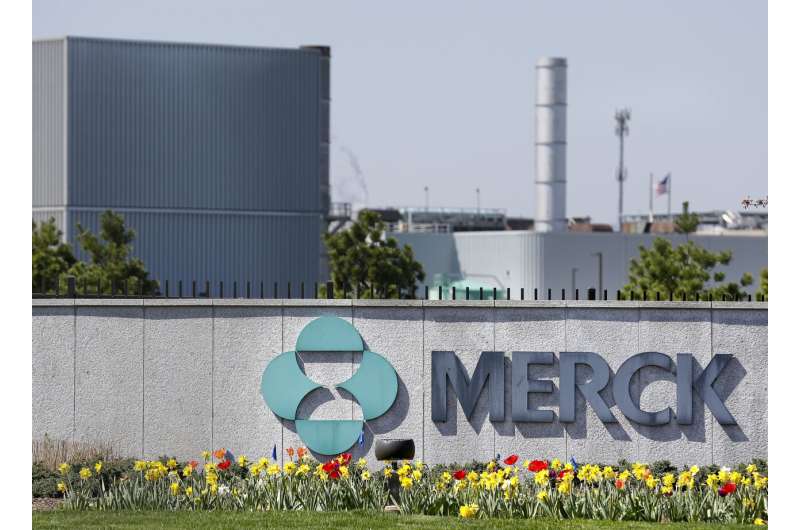Merck's global sales jump 12% in second quarter

Soaring sales of its cancer blockbuster and vaccines helped drive Merck's second-quarter profit up a whopping 54%, blowing past Wall Street expectations.
The maker of cancer immunotherapy drug Keytruda and diabetes pill Januvia also benefited from slightly reduced spending on research and restructuring, even as it becomes a bigger payer in advanced cancer medicines.
The Kenilworth, New Jersey, company raised its revenue forecast for the year by more than $1 billion.
That's despite the fact that Chief Financial Officer Rob Davis made a surprising comment that Merck isn't planning to hike U.S. prices for its drugs anymore to offset declining prices in other countries, as it has for several years.
"We no longer see the benefit of those price increases in the United States because of obviously the changing dynamics. And so as you look in total, we do continue to believe we're going to see declining price as we look forward impacting our margins," Davis said, responding to an analyst's question on a conference call.
Rising drug prices have drawn increasing furor from patients, politicians and advocacy groups, many newly formed, for the past three years, and both Congress and the Trump administration have been proposing various strategies to at least slow the rise of prices and patients' out-of-pocket costs. Drug prices have been an issue in the run-up to prior national elections, but the pressure has not been as sustained as it is today, leaving drugmakers, many of which make up to half their revenue in the U.S., nervous about their future results.
Investors didn't seem upset by the price discussion. In afternoon trading, Merck shares were up 78 cents at $83.26 after jumping as high as $85.17.
Merck reduced its 2018 earnings per share forecast due to a charge for the just-closed acquisition of Peloton Therapeutics.
During the quarter, Merck also bought a second company developing cancer therapies, Tilos Therapeutics, and a third developing ways to boost the immune system to fight diseases.
Until 5 years ago, Merck had little presence in cancer other than Emend for treating nausea and vomiting caused by chemotherapy. But Keytruda's dominance in the market—it's now approved for treating 20 cancer types and patient groups—has shifted much of Merck's research and revenue to oncology.
Keytruda sales jumped 58% to $2.63 billion in the quarter, as the biologic drug continues to rack up more approvals, most recently for patients with advanced small cell lung cancer who've failed other treatments, and as initial treatment for advanced head and neck cancer.
"We estimate Keytruda sales will exceed $16 billion by 2022, driven by continuing uptake within lung cancer and increasing indications into other types of cancers," Edward Jones analyst Ashtyn Evans wrote to investors.
Revenue also is growing from partnerships with other companies to jointly sell Lynparza for ovarian cancer and Lenvima for liver, kidney and thyroid cancer.
Meanwhile, sales continue to wane for older drugs for more common conditions including diabetes, high cholesterol, asthma and allergies.
"Given Merck's strong financial position, we believe the company will continue to supplement its internal drug development with acquisitions," Evans wrote.
Merck CEO Ken Frazier said he doesn't plan megadeals like the one rival Pfizer announced Monday because of their potential to disrupt research and development. Instead, he's looking for smaller deals that easily fit into Merck's portfolio.
The drugmaker reported net income of $2.67 billion, or $1.03 per share. Earnings, adjusted for one-time costs, were $1.30 per share, or 14 cents better than analysts anticipated.
Merck posted revenue of $11.76 billion in the quarter, up 12%.
Its Gardasil vaccine against the cancer-causing human papilloma virus had sales rise 46% to $886 million, and several other vaccines saw higher sales. Former top sellers Januvia and Janumet, pills for Type 2 diabetes, saw sales decline 4% and 9% respectively amid heavy pressure for low prices in the ultracompetitive diabetes field.
Sales of veterinary medicines such as flea-and-tick killer Bravecto increased 3% to $1.12 billion.
Merck now expects full-year earnings in the range of $3.78 to $3.88 per share, down from its April forecast of $4.04 to $4.14. The company forecast revenue in the range of $45.2 billion to $46.2 billion, up from the prior $43.9 billion to $45.1 billion forecast.
© 2019 The Associated Press. All rights reserved.




















